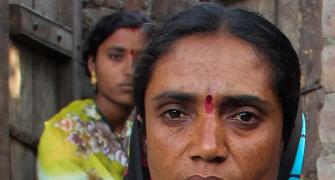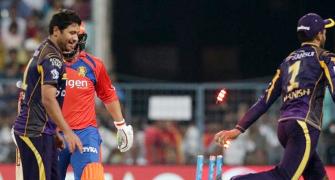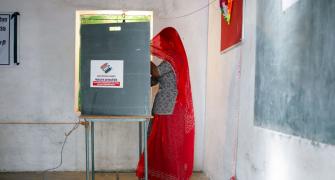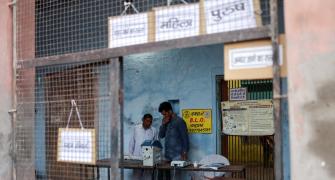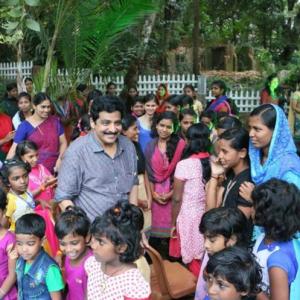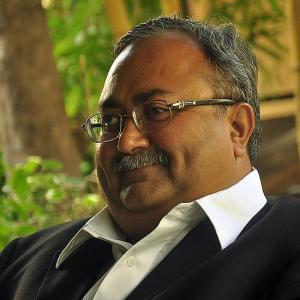
'We do not oppose any parent admitting his child to any English school.'
'We are opposed to the government grants that are to be given to such institutions.'
'If local languages are to be kept alive, at least they have to be taught at the primary level.'
The Rashtriya Swayamsevak Sangh's Goa chief Subhash Velingkar is angry and his anger is directed at the state's Bharatiya Janata Party government.
Velingkar explained to Syed Firdaus Ashraf/Rediff.com why he opposes the Goa government's decision to give grants to English-medium schools in the state.
Why are you opposing grants in aid to English-medium schools in Goa?
Giving grants to English-medium schools is against the National Educational Policy. So, we are opposing it.
Except Nagaland and Mizoram, no other state in India is giving grants for such schools, particularly primary schools (Classes 1 to 4).
When was this rule implemented in Goa?
This was implemented in 2011 by the Congress. When Shashikala Kakodkar, who was education minister in 1990, the issue had come up for the first time, as to which primary medium schools should be given grants.
At that time she decided very firmly in conformity with the National Educational Policy that grants must be given only to vernacular, and not English-medium schools. It was decided in 1990. This rule was changed after 21 years by the Congress in 2011.
Why was this rule changed?
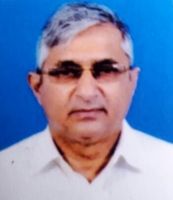
This was a political decision taken by the Congress to woo the minority because English-medium schools run by the archdiocese wanted to switch over to English from Konkani.
For the last 21 years they were getting grants to run Konkani schools, but when this decision came, they (the archdiocese) transformed their school from Konkani to English-medium overnight.
In order to make them benefit, the Congress introduced this change. So we protested under the Bharatiya Bhasha Suraksha Manch forum. This is an umbrella association for Konkani and Marathi lovers.
I am the coordinator for Goa state. We voted the Congress out of power in March 2012 as we conducted a campaign on this issue. The BJP government then came to power with Manohar Parrikar (now India's defence minister) as its leader.
When the BJP was in the Opposition it promised that it would cancel this grant and go back to the old rule.
Why did the BJP go back on that promise?
The BJP also wants to politicise this issue like the Congress. They kept telling us that they will keep giving grants to English-medium schools till a final decision is taken on the 'medium of instruction.'
We thought that the BJP would do it given time. However, to our dismay, after two years we were shocked to find that a cabinet decision was taken and the grants were confirmed.
But then three years of BJP rule were left and therefore, we could not agitate. So we were waiting for an opportunity.
What opportunity? Why has this issue come up now?
We had intended to agitate one year in advance of the (assembly) elections.
Then the Forum for Rights of Children to Education (FORCE) organisation started an agitation to pressurise the government to give grants to all Church-run schools teaching English at the primary level.
They forced the government to pass a bill in the assembly, which for the first time intended to give powers to minority institutions as far as Goa is concerned.
After Goa's liberation in 1961 (from Portugal) there was never such a move to discriminate on the basis of religion.
But to pressurise the government, the archbishop called all the Christian members of the assembly of all political parties. Five MLAs from the BJP, others from the Congress and the Goa People's Party got together and tried to pressurise the then new Goa Chief Minister Laxmikant Parsekar.
When that was done, we thought that there was going to be communal pressure on the government. We were afraid that the BJP government would fall prey to these tactics and so we started this agitation in July 2015.
Did this new bill get passed in the assembly?
This bill was tabled in the assembly, but was referred to a select committee. There was an indefinite strike called by FORCE leaders. The BJP sent 11 MLAs to assure them in writing. It is due to our pressure that the bill has not so far passed.
What is the problem if people want to choose and study in English?
We do not oppose any parent admitting his child to any English school. We are opposed to the government grants that are to be given to such institutions.
One can pay the fee and admit the child in any kind of school. But the parents must pay their own money.
What about parents who want to send their children to English-medium schools but cannot afford to pay the fees?
No country gives grants to a foreign language. According to UNESCO (United Nations Educational, Scientific and Cultural Organisation) principles, only the mother tongue is given grants. Accordingly, the same rule applies in our country too.
This has been our national educational policy since Pandit Jawaharlal Nehru and now Prime Minister Narendra Modi's rule. This line of action was never disturbed until the Congress changed it in 2011. The BJP is now toeing the same line.
Do you think if grants are given to English-medium schools, vernacular schools will die?
They will be drastically affected. Here, the medium of instruction from Class 5 till graduation is English. That has been accepted here in Goa.
Our point is only for primary education. If local languages are to be kept alive, at least they have to be taught at the primary level as per national norms.
In Mumbai, I have seen many Marathi schools shut down despite government grants. There is a trend to send children to English-medium schools.
That is a different issue. Quality of education has to be improved, and that has to be done separately.
As far as the functioning of the government is concerned, the government should not give grants to foreign languages.
The government should protect local languages and that is the mother tongue of this country. In every country, every government is doing that.
You think we can become like China or South Korea who did not adopt English and still became an economic power.
Yes. Their doctors, engineers learn in their own language. They study their national language in colleges too.
We are not against English being taught after Class 5. That has been established long back. Now that primary education is affected we will be de-culturalised. Our cultural roots will be cut off.
There is a complaint about people who oppose English-medium schools. Critics say these people send their own children to English-medium schools.
Those people are exceptions. The main thing is that one should not go against the national education policy.
What is the BJP central leadership telling you?
We do not know if someone has approached the BJP leadership at the Centre. The Goa government is not of the opinion that they should cut the grant.
How many English-medium schools get these grants?
Around 126 schools run by the church get government grants. Another 139 English-medium schools are not getting government grants. Only the church-run schools get grants.
You are in the RSS and you are opposing the BJP.
This is a matter of principle. We are acting here as free citizen of the country.
But you are the RSS chief in Goa...
I am the Sanghchalak of Goa. There are certain principles of life beyond party and individual considerations. This is what the Sangh has taught us.

